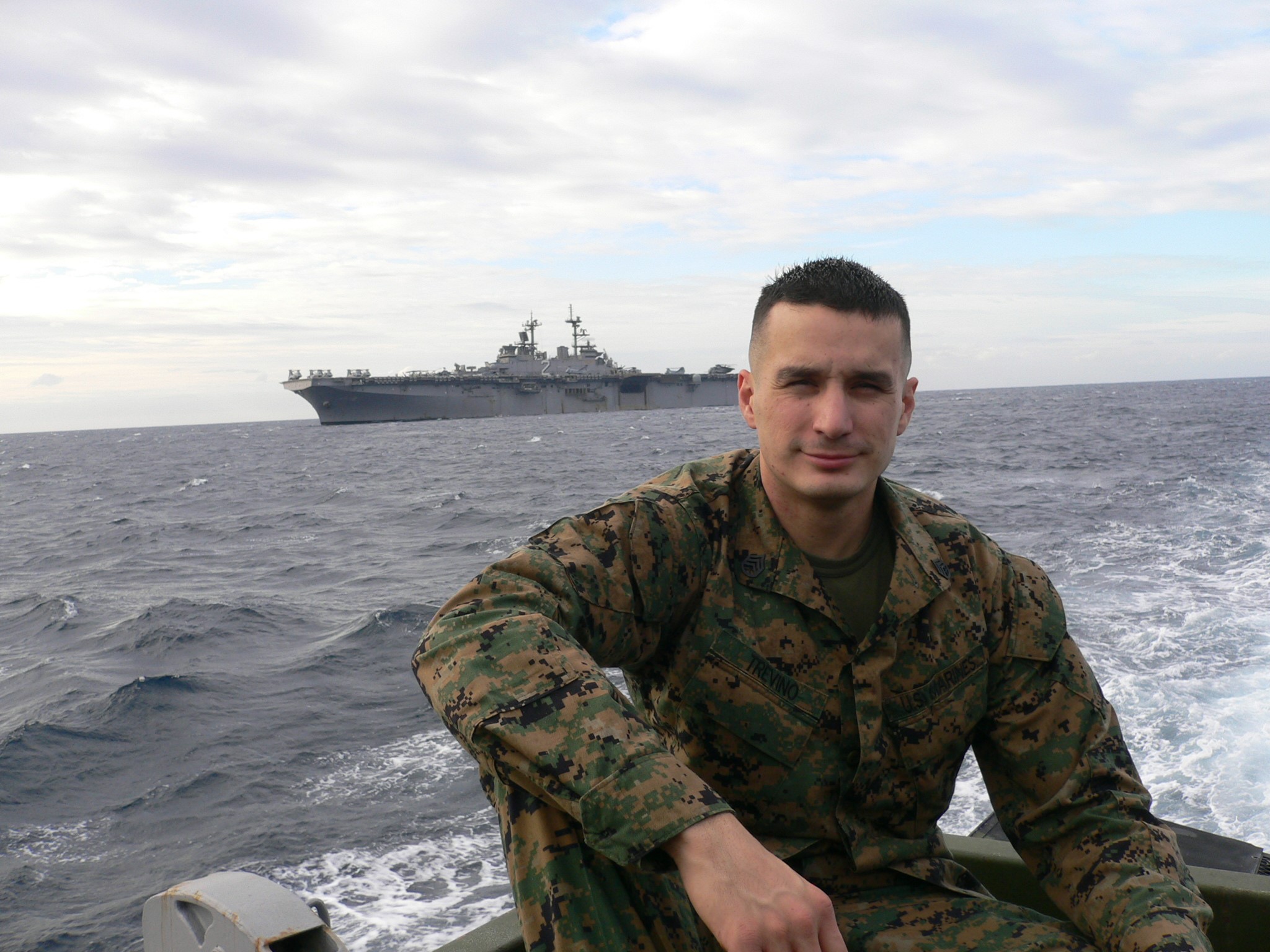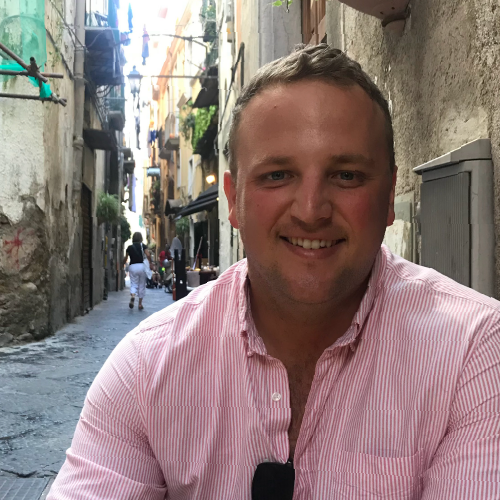After 21 years of service in the military, Rafael moved from active duty and joined Northrop Grumman.
Mission Success in a Different Terrain
In the Sierra Nevada mountains, Heather Ordoñez found herself in a race against time.

By Tori Prestianni
In the middle of the Sierra Nevada mountains, in deeply forested terrain, Heather Ordoñez found herself in a race against time. With just four hours of sleep in four days and 199 miles logged, the Tahoe 200 finish line was within reach and the 105-hour cutoff mark was nipping at her heels. For some, this might have seemed like an impossible task, but for Heather – it was simply another mission and one that she would not fail.
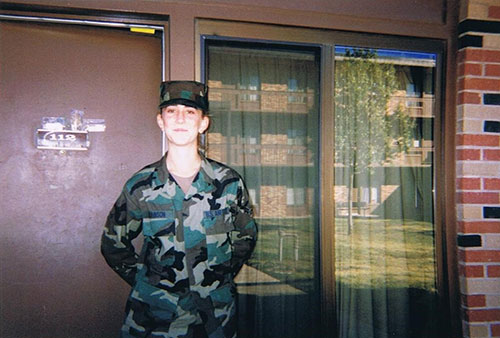
A Life of Planning Missions
It all started in 1997 when Heather graduated from the University of Delaware and entered the United States Air Force (USAF) as mission planner, developing flight paths and intel collection for U-2 missions. After four years and a deployment, Heather transitioned to civilian life and began a career with Northrop Grumman.
Today, Heather is a program manager for classified programs and closing in on 25 years with the company. She’s supported programs in both engineering and program management functions, crediting traits she picked up in the USAF for accomplishments during her tenure: meticulous planning, scheduling, multi-discipline collaboration and consistent follow-through.
Navigating a New Terrain
In 2016, Heather’s chaperoned her daughter in a 5K for Girls on the Run. She didn’t know it then, but that was the catalyst to Heather’s passion for running and current 1,700-mile race resume. With every stride, she unlocks new accomplishments, including completing more than 28 ultramarathons and her latest endeavor: the Tahoe 200.
The Tahoe 200, noted as “a lifetime in 200 miles,” is one of only fifteen 200-mile foot races in North America. This journey-by-foot event takes place around the largest alpine lake in North America and encompasses three national forests. The race is typically capped at 250 runners, with a completion rate of only 52%.
Ultramarathons, such as the Tahoe 200, are lottery races, meaning participation is luck of the draw. Interested runners first need to meet specific requirements, such as completing a qualifying race within the allowed time, just to apply. A lottery drawing then determines the field.
After eight years of running and completing the prerequisites, Heather’s name was selected in 2023 and planning began. “You can’t wing a 200-miler,” said Heather. “The distance is so massive, you have to strategically plan, train, rest and recover if you want to cross the finish line.”
She spent the next year researching, crafting a plan and solidifying logistics – all skills she exercises daily in her career. “A key to successful execution, no matter the mission, is analyzing all avenues, planning for multiple outcomes, making mistakes, continuously shifting and still pushing to meet your commitments,” Heather noted.
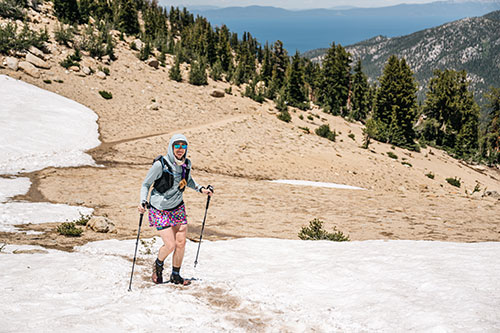
Overcoming Obstacles
Day one of the Tahoe 200 was an 18.6 mile trek between Heavenly Aid and Spooner Aid stations; one of the hardest sections of the race (Photo Credit: Anastasia Wilde).
“For years I planned and executed missions across various fronts,” said Heather. “Going into the race I was determined to persevere through the obstacles, and knew if I stuck to my plan, I could finish. But when my body began rooting against me, my mind went down a dark path and all I could hear was ‘you aren’t going to finish’.”
In 200-mile races, runners are allowed a “crew,” whose primary purpose is to care for, support, fuel and motivate their runner. As Heather was going in and out of consciousness, her crew became her lifeline.
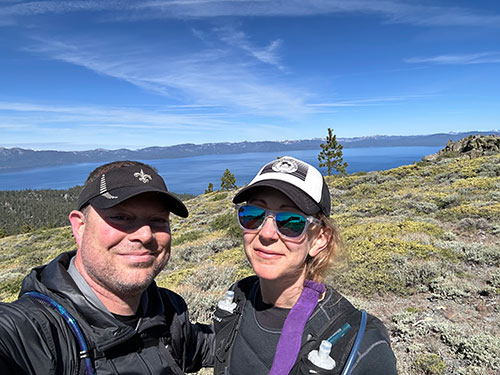
Eric Ordoñez, Heather’s husband and fellow Northrop Grumman employee, was one of those crew members. At Heather’s lowest point, seconds away from dropping out of the race, Eric was there, reminding her of her plan.
“Just get to the next aid station; remember it’s all downhill from here,” said Eric.
That was the motivation Heather needed to regain focus.
“He knew exactly what I needed to hear to keep going – stick to my plan,” Heather noted. “His motivation was the light at the end of a dark tunnel that day.”
Heather and her husband, Eric Ordoñez, on Day four of the Tahoe 200 (Photo credit: Heather Ordoñez).
Heather pushed through, reaching the next step in her plan and her mind settled. After some medical attention, fluids and a few minutes of deep rest, Heather was back on track and ready to tackle the remaining 100 miles.
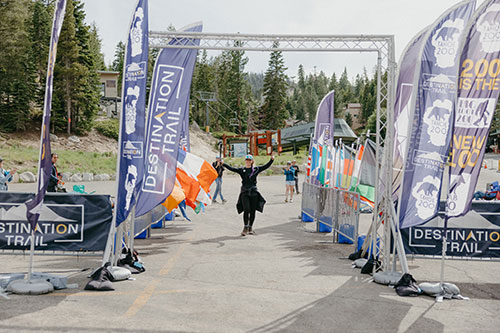
The Pinnacle of Execution
Despite being a champion in running, Heather’s planning and execution got her across the finish line in Tahoe, placing her among the 0.00008% of people worldwide who can say they’ve finished a 200-mile ultramarathon.
“I set out to accomplish this challenge,” said Heather. “With the year-long preparation, training and years of experience in executing missions, I was confident my plan was bullet-proof. Once I stepped foot on the terrain, the only thing I had left to do was execute.”
Life at Northrop Grumman
Your work at Northrop Grumman makes a difference. Whether you want to design next-generation aircraft, harness digital technologies or build spacecraft that will return humanity to the moon, you’ll contribute to technology that’s transforming the world. Check out our career opportunities to see how you can help define possible.
